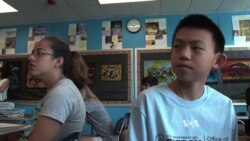In his lively classroom at LaDue Middle School, Vincent Flewellen leads a lesson more immediate than algebra and grammar.
It is a lesson in life, shared in part through his students.
Their school is in St. Louis, Missouri, not far from suburban Ferguson, where unarmed black teenager Michael Brown was shot dead in the street by a white police officer last August. The shooting sparked weeks of protests in both communities and beyond, including after a grand jury decided in November not to charge officer Darren Wilson in the death. The U.S. Justice Department issued a scathing report in March that found racially discriminatory practices in Ferguson’s law enforcement and government and called for reforms.
"With the events of Ferguson and Mike Brown’s just in our backyard … there was no way I could just go with the course as I had previously done," said Flewellen, who teaches multicultural studies. "We needed to have some conversations."
Gone are the days when his course only covered topics like foreign foods and immigration, Flewellen said. Recurring headlines – especially about young men of color dying after police encounters – drive more of the curriculum and conversation with his students.
"It has been mind-blowing the number of reports where it seems to be another, you know, Michael Brown, Trayvon Martin, Eric Garner, Tamir Rice, countless numbers," he said, reeling off the names of other young African-American males killed under questionable circumstances.
Room for frank discussion
Flewellen believes his classroom is one of few places where these students of different races and backgrounds can openly share their feelings, concerns and questions about the events happening in the world around them. They openly discuss police brutality and racial tension.
"If somebody’s running away from you and they’re not, like, dangerous but you need to catch ’em, like, shoot ’em in the foot or something – not, like, kill them," one girl says, her voice rising in frustration.
Flewellen is empathetic.
"Kids have questions. Kids look to us [teachers] to help shape their understanding of the world in which they live. I get to do that without interjecting my own personal thoughts," he said, explaining he tries to be objective to foster the dialogue.
"But I can help facilitate a conversation that allows and provides a space for a kid who might be on one end of the spectrum of thought and still have a conversation with a kid on the other end within the context of this classroom, and have it be meaningful and insightful."
Difficult subjects
It is the kind of conversation many people shy away from because of race’s charged history and sensitive nature, said Brian Hutchison, who coordinates the University of Missouri-St. Louis’ school counseling program.
"Over generations, [race has] become a taboo subject where we don’t feel like we have the facility as individuals to talk about it in a way that is not harmful, that is constructive, or might not make us feel like we are in peril," said Hutchison, an associate professor in UMSL’s College of Education.
But Hutchison, who’s white, says a middle-school classroom like Flewellen’s is an ideal place to have these conversations so that a broader understanding of classmates’ life experiences better informs attitudes about race.
"A more open and authentic discourse has healing power, and has power of acknowledgement and empowerment to people of color, and is honestly for the greater good," Hutchison said. "There just aren’t enough people doing it yet. There aren’t enough curricula for it yet…."
Flewellen says multicultural studies is a required course, though its focus shifted in the wake of Ferguson. He says while some parents have voiced concerns about his teaching and the way in which he portrays some of the recent high-profile police incidents, the class is growing in popularity among the students.
"Once they’re here, I think they definitely enjoy it, and those [who] are not in this class certainly wish they were in the class."
Flewellen says his wish is for this kind of class to appear in more schools throughout the country. He believes it could lead to less turmoil and unrest – and greater understanding between police officers and the communities they serve and protect.













